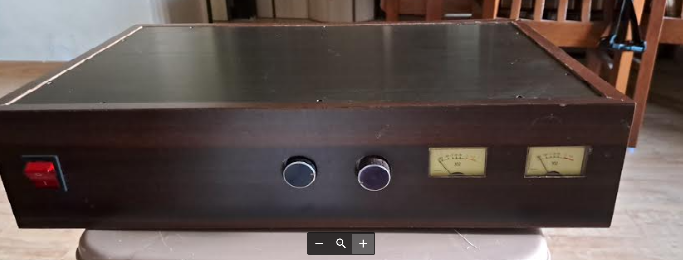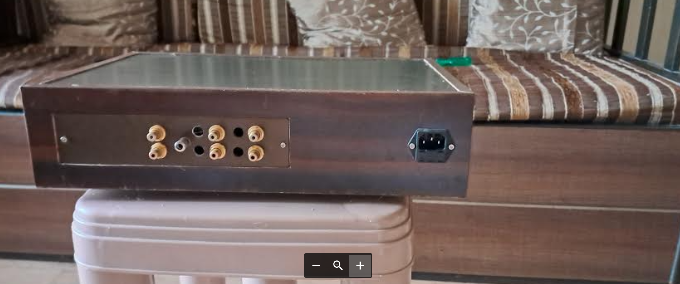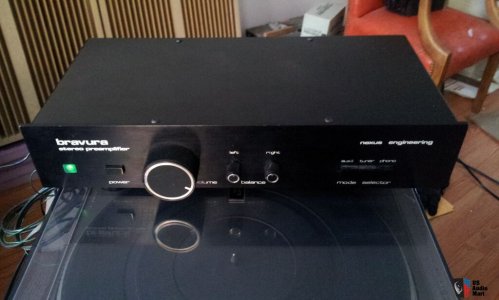I could finally conclude my phono preamplifier + passive line stage amplifier yesterday after almost an year of tinkering around. Only pending activity is to connect the analogue vu meter which is more nostalgic than any value.
This build was more challenging than my monoblocks as the mononlocks are tube based with very few part count. The phono preamplifier per say was very easy to execute and took only a day to complete and test - both channels. But the power supply stage were quite challenging which can either make or brake your phono design. This needs some explanation - how?
I was intrigued by my earlier success of using very low value filter capacitor in my phono stage around 270uF each + and - rails. (My experience of using higher value filter capacitors in power supply is - the sound stage is very sterile and very boring to listen to. The sound stage becomes involving and interesting by just reducing the filter capacitor by a factor of 10). But the same power supply did not work well in the new PCB introducing a lot of ac noise and hum which drove me nuts. This could be because of JFET change from Toshiba ( discontinued and not available) to onsemi (available as of now). The onsemi JFET had a more current drain than the Toshiba, thereby demanding a more robust power supply. I tried increasing the filter capacitor from 270uF to 1800uF but this did not reducee much nosie and for a DC of 15v the AC noise measured was 0.6v which can cause quite a noticable hum. I later replaced the 1800uF to a motor PP 100uF capacitor and this reduced noise to just 0.3V but not enough. I later needed to add a 1H, 75 ohm choke in series with the supply to reduce hum and this reduced hum from 0.3v to just 0.062v which is a significant drop but that could also give you some hum in the output. I later added a RC filter with a 10ohm +270uF (bipolar) followed by a 1H + 100uF PP capacitor. This gave me a AC noise of just 1mv at the DC supply rails. This took me a significant amount of build time to achieve this but the outcome was more than satisfactory.
The output of the phono stage had a DC offset voltage of 2vdc which could not be directly coupled to my power amplifier. I needed to use a coupling capacitor for blocking DC. This coupling capacitor has its own signature and could sound very mechanical and artificial in many records. I tried many capacitors ranging from 2.5uF till 50uF and various brands like Mundorf, Jantzen, Indetch oil, Tibcon oil. Mundorf and Tibcon were best of the lot but still were very boring to listen due to their signatures. As only purpose of using the coupling capacitor was to block the DC, i thought of why not use an audio transformer instead. As i was having the Delta audio transformer (courtesy @Beast_of_burden ) lying with me, i connected that after necessary impedance matching and gave them a listen. I finally got the signature that i was looking for and am listening to my records since yesterday. The output voltage measured with an input of 5mv was 1000mV which is a bit high, but as there is no distortion or any kind of overload issue i am ok with the added gain. I anyway have my volume control pot to adjust that gain.
Thanks for looking.
This build was more challenging than my monoblocks as the mononlocks are tube based with very few part count. The phono preamplifier per say was very easy to execute and took only a day to complete and test - both channels. But the power supply stage were quite challenging which can either make or brake your phono design. This needs some explanation - how?
I was intrigued by my earlier success of using very low value filter capacitor in my phono stage around 270uF each + and - rails. (My experience of using higher value filter capacitors in power supply is - the sound stage is very sterile and very boring to listen to. The sound stage becomes involving and interesting by just reducing the filter capacitor by a factor of 10). But the same power supply did not work well in the new PCB introducing a lot of ac noise and hum which drove me nuts. This could be because of JFET change from Toshiba ( discontinued and not available) to onsemi (available as of now). The onsemi JFET had a more current drain than the Toshiba, thereby demanding a more robust power supply. I tried increasing the filter capacitor from 270uF to 1800uF but this did not reducee much nosie and for a DC of 15v the AC noise measured was 0.6v which can cause quite a noticable hum. I later replaced the 1800uF to a motor PP 100uF capacitor and this reduced noise to just 0.3V but not enough. I later needed to add a 1H, 75 ohm choke in series with the supply to reduce hum and this reduced hum from 0.3v to just 0.062v which is a significant drop but that could also give you some hum in the output. I later added a RC filter with a 10ohm +270uF (bipolar) followed by a 1H + 100uF PP capacitor. This gave me a AC noise of just 1mv at the DC supply rails. This took me a significant amount of build time to achieve this but the outcome was more than satisfactory.
The output of the phono stage had a DC offset voltage of 2vdc which could not be directly coupled to my power amplifier. I needed to use a coupling capacitor for blocking DC. This coupling capacitor has its own signature and could sound very mechanical and artificial in many records. I tried many capacitors ranging from 2.5uF till 50uF and various brands like Mundorf, Jantzen, Indetch oil, Tibcon oil. Mundorf and Tibcon were best of the lot but still were very boring to listen due to their signatures. As only purpose of using the coupling capacitor was to block the DC, i thought of why not use an audio transformer instead. As i was having the Delta audio transformer (courtesy @Beast_of_burden ) lying with me, i connected that after necessary impedance matching and gave them a listen. I finally got the signature that i was looking for and am listening to my records since yesterday. The output voltage measured with an input of 5mv was 1000mV which is a bit high, but as there is no distortion or any kind of overload issue i am ok with the added gain. I anyway have my volume control pot to adjust that gain.
Thanks for looking.
Last edited:




